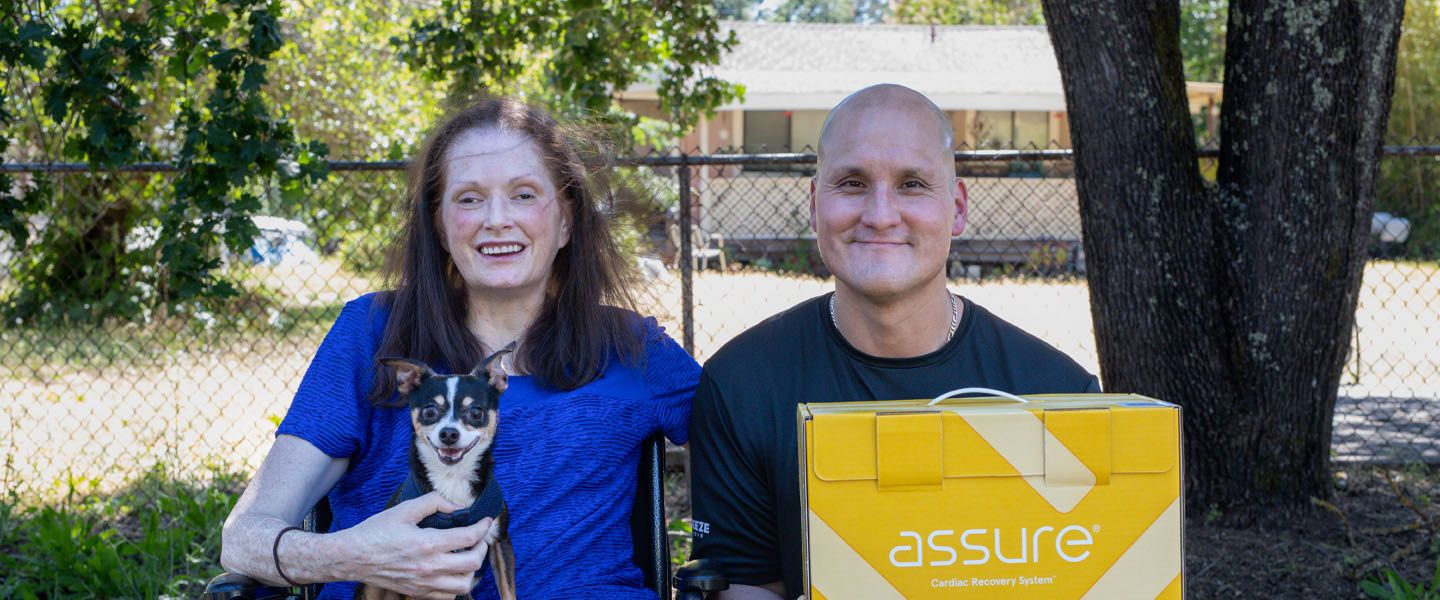A Rare Heart Arrhythmia Calls for a Brilliant Save
In February 2024, during a visit to her local hospital for treatment of diabetic ulcers on her feet, the unexpected happened — Tammy Viale-Lemley, 46, suffered a heart attack. After being transported to the cardiac unit at MarinHealth Medical Center, Dr. Vivek Iyer, a cardiologist, believed Tammy was at risk for sudden cardiac death and that her condition warranted a wearable cardioverter defibrillator ( WCD). Tammy was feeling fortunate she had been in the hospital when her heart attack occurred, making the decision to wear a WCD when she went home easy.
Kestra Associate Sales Representative Amy Blatt arrived at the hospital prior to discharge ready to fit Tammy for an ASSURE WCD. Despite Tammy being visually impaired, she was successfully able to complete user training and operate the system. Fortunately for Tammy, adapting to unfamiliar and ever-changing situations is a natural gift.
The ASSURE Event
About three weeks later, on the evening of March 11, Tammy started having heart palpitations and became dizzy, she rested and eventually the feeling passed. Later that night, things turned more serious. Tammy fell suddenly while walking through her kitchen and began to lose consciousness. During this time, the ASSURE WCD began sending out alerts that it was going to deliver a shock. Because the HeartPoint™ Alert Button was designed to provide a simple way of interacting with the system—by hearing, feeling, and touching—Tammy was able to easily press the button and override the shock, “it immediately came back on and then I blacked out,” she said.
While now unconscious, the system alerted again, and the ASSURE WCD administered a shock at 9:23 PM, followed by audible prompts to call 9-1-1. Carlo, her husband, made the call, but by then an ambulance was already on the way. The shock event data had been transmitted from the WCD to the remote patient data platform Kestra CareStation®, and a dispatch operator was alerted to the event. The operator attempted to call the patient and the emergency contact, and when neither picked up, they dispatched an ambulance. Subsequently, Amy was notified of a shock delivery and contacted Tammy’s clinical care team. Amy was able to send crucial information on Tammy's condition to the ER doctor at Providence Queen of the Valley Medical Center within minutes of Tammy's arrival by ambulance.
At the hospital, Tammy was examined by interventional cardiologist Sergio Manubens in the ICU. She recalled him saying, “If I didn’t have it (the WCD), they would now be making funeral arrangements for me.”
As in Tammy’s case, the journey of a cardiac patient is often prone to unexpected and traumatic experiences. That level of stress also takes a toll on loved ones. For Carlo, Tammy’s cardiac arrest was an event he will never forget. “I’d never seen anyone have cardiac arrest before,” he said. Carlo now praises the ASSURE WCD, “Just knowing that device was there and that it worked was amazing to me because she wouldn’t be here without it.”
But March 11th was also Carlo’s birthday. He said, “This is the greatest gift you guys gave me, that’s how I look at it.” Tammy received her ICD implant the next day and has been doing well ever since.
Tammy’s experience continues to amaze and provide insights. As it turned out Tammy had a relatively rare arrhythmia—Torsades de Pointes—a specific type of ventricular tachycardia that is both difficult to diagnose and deadly if left untreated.
The ASSURE WCD was truly a lifesaver, Tammy is alive because of it. She now is able to spend more time with Carlo and their two dogs in her hometown of Sonoma.
